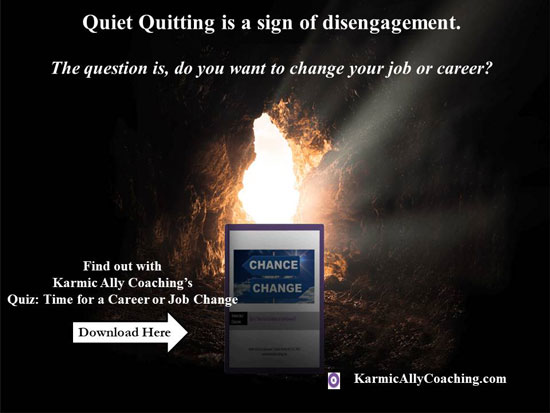This post has already been read 544 times!

The pandemic also resulted in new jargon to describe workforce behaviours and the underlying desire to manage good mental health.
First it was the Great Resignation. Then the Great Regret. We also had the rise of the Gig Economy.
Somewhere in between all of this Quiet Quitting became a buzz word in March 2022 that went viral on social media as the latest career trend.
Coined by Bryan Creely, a corporate recruiter turned career coach, his TikTok video on the subject went viral. The concept caught everyone’s imagination and became the topic of numerous debates and articles.
Honestly speaking, it’s not a new idea and has been around for a long time even if we didn’t call it Quiet Quitting then.
The meaning of Quiet Quitting
First of all, Quiet Quitting doesn’t mean people are secretly or openly quitting their jobs. Or that they aren’t doing their job at the workplace.
What it means is that people have stopped taking on more than their fair share of the workload or going beyond the call of duty.
Gone are the days when an ambitious professional was ready to put life on hold to pursue their dream of rising up the corporate ladder. They put in the 80 plus hours work week and did tasks that weren’t in their employment contract.
Now they’re simply doing what is specified in their job description. They’re not succumbing to wage theft which is what many organizations have come to expect of their employees. It had become normalized in the workplace without considering that over time, it can lead to employee disengagement.
Quiet quitting can also be very personal and what it means depends on who you ask. For some, it’s a way of keeping your perspective, so your job won’t take over the rest of your life.
Others see a darker side. They say it’s a sign of being disengaged at work, and it could have a negative impact on your career and society. Normally we know when it’s time to find another job and move on.
In this case, we stay where we are but change our work habits.
A Gallup poll found that at least half of American workers say they’re doing the minimum to meet their job description.
(Gallup’s findings are based on a random sample of 15,091 full- and part-time U.S. employees aged 18 and over, surveyed in June of 2022.)
Why your employer isn’t happy about Quiet Quitting
When I first heard of quiet quitting I remembered an interesting conversation I had many years ago with the wife of my employer’s legal counsel at a party.
The topic was appreciation for hard work and maintaining work life balance. This lady who was a corporate professional turned homemaker during her husband’s assignment in India pointed out that we were paid a salary and expected to do our job.
Doing more than was expected was the professional’s choice and one shouldn’t expect the employer to tell the person to do less because that would never happen.
So why on earth would any employer want their employee to stop taking on “above-and-beyond” tasks for free?
For sure we’re often willing to put in the hours when the goal of a promotion or career advancement is important to us.
But the problem starts when it becomes a regular practice. Sadly, employers do bank on their employees taking on the extra work for free.
There’s always pressure to reduce costs and headcount. When the workforce realizes the effect it’s having on their personal lives, health and finally stops, it affects the business bottom-line.
Find the middle ground between being a workaholic and just going through the motions for the sake of your health
It’s important to avoid being at the extremes on the spectrum of excessive work and only performing your contractual obligations.
You may feel like you’re walking on eggshells but you need to focus on both having balance in your life while also protecting your career.
Maintaining Balance
You need a personal life for the sake of your mental health. Otherwise, you’re at risk for burnout and becoming overwhelmed if you were to be laid off.
In fact, some studies have found that working too much is one of the biggest life regrets.
5 Strategies to help you maintain balance:
- Set boundaries. It’s up to you how much you want to integrate your personal and professional activities or keep them separate. Find an arrangement that allows you to lead a happy and meaningful life.
- Limit your hours. Excessive overtime interferes with your wellbeing, as well as your performance. Create a reasonable schedule. Stick to your quitting time, even when you work from home.
- Build relationships. Connecting with colleagues makes work more fun and satisfying. Engage in small talk and socialize outside the office.
- Take vacations. Enjoy your time off from work. Visit exciting places and spend time with family and friends. Give yourself some downtime the rest of the year too. Go out for lunch and schedule breaks between tasks.
- Practice self-care. Investing in yourself makes you more resilient. Eat healthy foods and exercise regularly. Manage stress constructively on and off the job.

Protecting Your Career
What you do for a living can have a big impact on the quality of your life. Be proactive about making choices that align with your values and help you to reach your goals.
Consider using these techniques to protect your career:
- Communicate directly. Many experts regard poor management and remote work as two main reasons behind Quiet Quitting. Talk face-to-face as much as possible. Have weekly one-on-one sessions with your boss.
- Clarify expectations. Understand your boss’ priorities and how your performance will be measured. Ask for feedback and put things in writing.
- Show concern. Let your colleagues know that you care about their wellbeing. Be friendly and helpful. Listen attentively. Praise them for their talents and accomplishments. Earn their trust by doing your fair share of the work and holding yourself accountable.
- Connect with the mission. Figure out how your role relates to the overall purpose of your organization. If you disagree with your company’s values, you may be able to make accommodations or you may need to move on.
- Continue learning. Keep your skills up to date and give yourself challenges that motivate you. Take courses online and read books about your industry. Join committees and volunteer for interesting projects.
- Stay solvent. There’s already some talk about quiet firing as a passive-aggressive way to pressure difficult employees to leave. Unfortunately, that lowers morale and could leave you without a paycheck. Think about your financial future even if you dislike your job.
Final Words about Quiet Quitting
I personally believe concerns about Quiet Quitting are exaggerated. Perhaps it wasn’t expected when we got a chance to reassess our priorities during the pandemic lockdown.
But the questions it raises are real for us in the workforce and for businesses that need to adjust to the new reality.
Remember, you spend about one-third of your life at work, so make that time as pleasant as possible. More importantly, pursue your purpose through whatever means work for you. Even if it means a job or career change.





 I adhere to the Certified Coaches Alliance Code of Ethics and Standards. A copy is available on request.
I adhere to the Certified Coaches Alliance Code of Ethics and Standards. A copy is available on request.
 Let's Talk through the Connect Form:
Let's Talk through the Connect Form:
Thank you for this very insightful post! Post corona, many people are feeling a sense of dissonance at work, and quiet quitting is a reality. Great to know that this is openly acknowledged now, and that there are strategies one can use to take responsibility for one’s own situation.
My pleasure Vanita. Quiet quitting has existed for some time but it is becoming an acknowledged behavior post the pandemic. At the end of the day, we have to take ownership of our careers and more importantly, what works for us as a whole.